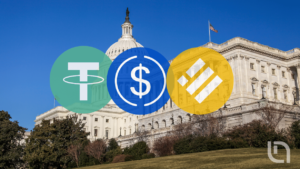-
Nadeem Anjarwalla, a Binance executive, escaped custody in Nigeria amid an investigation into Binance for allegations including crypto crime and tax evasion.
-
Nigerian authorities have accused Binance of non-compliance with value-added and company income tax obligations and of facilitating tax evasion through its platform.
-
This situation underscores the urgent necessity for harmonized international regulation and enforcement in the cryptocurrency industry to prevent financial crimes.
In a dramatic turn of events, Nadeem Anjarwalla, a key figure at cryptocurrency giant Binance and its regional manager for Africa, has reportedly escaped custody in Nigeria.
This development was confirmed by the office of the president’s national security adviser, highlighting a significant twist in the ongoing investigation into Binance’s operations within the country.
Anjarwalla, who holds dual British-Kenyan nationality, was the subject of a criminal probe but fled the country under mysterious circumstances.
Escaping the Net: Binance Executive Flight Shakes Nigeria’s Crypto Sphere
Following Anjarwalla’s unexpected escape, Nigerian security agencies have intensified their efforts, collaborating with Interpol to issue an international arrest warrant. Family sources describe the circumstances surrounding his departure as “lawful means,” which has sparked many speculations and raised questions about Nigeria’s enforcement and custody protocols.
The incident comes against heightened scrutiny over Binance’s activities in Nigeria, where authorities have launched a thorough investigation into allegations of crypto crime, including tax evasion and potential facilitation of money laundering through the platform.
The Federal Inland Revenue Service has formally charged Binance with financial misconduct, including the non-payment of value-added and company income tax and accusations of aiding customers in tax evasion.
As the Nigerian government tightens its grip on cryptocurrency firms over concerns of financial impropriety, Binance faces significant legal and regulatory challenges. With over $26 billion worth of transactions flagged for untraceable sources, the central bank has blamed cryptocurrency platforms like Binance for contributing to the naira’s instability.
This situation has prompted a rigorous clampdown, culminating in a hefty $10 billion fine against Binance. This highlights the urgent need for more explicit crypto guidelines and robust compliance mechanisms.
Related: Nigeria’s FIRS Accuses Binance of Tax Evasion: The Unfolding Legal Battle
The saga of Anjarwalla’s escape and the ensuing legal battles against Binance have sent shockwaves through Nigeria’s crypto community. As Africa’s largest economy grapples with an economic crisis exacerbated by currency devaluation and inflation, the role of cryptocurrency platforms in the financial ecosystem has come under intense scrutiny.

This incident underscores the complex interplay between innovation in the blockchain space and the imperative for stringent regulatory oversight to prevent crypto crime and ensure tax compliance.
The spotlight on Binance’s legal troubles in Nigeria calls for critically evaluating the existing regulatory framework governing blockchain gaming and cryptocurrency operations.
With international arrest warrants and accusations of tax evasion mired in controversy, industry leaders and regulatory bodies have a clear mandate to collaborate on formulating clear guidelines that safeguard the interests of all stakeholders while promoting the responsible growth of blockchain technologies.
The fallout from Binance executive Nadeem Anjarwalla’s escape has cast a spotlight on Binance’s operations and the broader implications for the cryptocurrency industry in Nigeria and beyond.
This incident has illuminated the critical need for enhanced security measures and legal protocols to manage the detention of individuals involved in high-stakes financial investigations.
As Nigerian authorities collaborate with Interpol to secure an international arrest warrant, the global crypto community watches closely, recognizing the potential for international legal precedents in managing and regulating crypto entities.
Anjarwalla’s escape and the subsequent legal actions underscore a pressing need for a harmonized approach to crypto regulation and enforcement across jurisdictions.
Disparities in how countries manage crypto crime and enforce rules have become apparent, prompting calls for international cooperation and standardization of crypto regulatory practices.
This incident serves as a wake-up call for regulatory bodies worldwide to strengthen their legal frameworks to address the unique challenges posed by the digital nature of cryptocurrency and its cross-border implications.
The ongoing saga highlights the urgency for regulatory bodies, such as Nigeria’s Federal Inland Revenue Service and central bank, to establish clear, comprehensive guidelines for cryptocurrency operations, including tax compliance, anti-money laundering measures, and financial crime prevention.
For the crypto industry to thrive, a balance must be struck between fostering innovation and ensuring robust regulatory oversight to protect investors and maintain financial stability.
Collaboration between governmental agencies and the crypto community could lead to more transparent, secure, and stable crypto markets, ultimately benefiting all stakeholders in the global financial ecosystem.
The escape of a Binance executive under investigation for crypto crime has become a pivotal moment for the cryptocurrency industry. It spotlights the need for more robust regulatory frameworks, international cooperation, and a united effort to achieve greater transparency and security in the fast-evolving crypto landscape.
Also Read: Cape Town: The Emerging Crypto Hub of Africa
In conclusion, the departure of a high-profile Binance executive amid allegations of crypto crime and regulatory violations marks a pivotal moment for Nigeria’s cryptocurrency landscape.
As the nation seeks international cooperation to address these challenges, the incident catalyzes a broader discourse on the need for enhanced regulatory clarity, stringent compliance standards, and a collaborative approach to navigating the complexities of the crypto economy.
The path forward demands a balanced strategy that reconciles cryptocurrencies’ innovative potential with the imperative to uphold financial integrity and protect the economy from illicit activities.
- SEO Powered Content & PR Distribution. Get Amplified Today.
- PlatoData.Network Vertical Generative Ai. Empower Yourself. Access Here.
- PlatoAiStream. Web3 Intelligence. Knowledge Amplified. Access Here.
- PlatoESG. Carbon, CleanTech, Energy, Environment, Solar, Waste Management. Access Here.
- PlatoHealth. Biotech and Clinical Trials Intelligence. Access Here.
- Source: https://web3africa.news/2024/04/19/news/binance-executive-nadeem-nigeria/
- :has
- :where
- 1
- a
- About
- Accusations
- accused
- Achieve
- across
- actions
- activities
- address
- africa
- After
- against
- agencies
- All
- Allegations
- Amid
- an
- and
- Another
- anti-money laundering
- apparent
- approach
- arrest
- AS
- At
- Authorities
- Balance
- balanced
- Bank
- battles
- bbc
- BE
- become
- benefiting
- between
- Beyond
- Billion
- binance
- blockchain
- blockchain gaming
- Blockchain space
- blockchain technologies
- bodies
- broader
- but
- by
- call
- Calls
- cape
- catalyzes
- central
- Central Bank
- challenges
- charged
- charges
- circumstances
- clampdown
- clarity
- clear
- closely
- collaborate
- collaborating
- collaborative
- come
- comes
- community
- company
- complex
- complexities
- compliance
- comprehensive
- Concerns
- conclusion
- CONFIRMED
- contributing
- controversy
- cooperation
- could
- countries
- country
- Crime
- Crimes
- Criminal
- crisis
- critical
- cross-border
- crypto
- crypto community
- crypto crime
- crypto economy
- crypto exchange
- CRYPTO FIRM
- crypto hub
- Crypto Industry
- crypto landscape
- Crypto Markets
- Crypto regulation
- cryptocurrency
- Cryptocurrency Industry
- culminating
- Currency
- Custody
- Customers
- demands
- departure
- describe
- detention
- Devaluation
- Development
- digital
- discourse
- dramatic
- dual
- Economic
- economic crisis
- economy
- ecosystem
- effort
- efforts
- emerging
- enforce
- enforcement
- enhanced
- ensure
- ensuring
- entities
- escape
- establish
- evaluating
- evasion
- events
- exchange
- executive
- existing
- faces
- facilitating
- failing
- fallout
- family
- Federal
- Figure
- financial
- financial crimes
- financial stability
- financial-crime
- fine
- Firm
- firms
- flagged
- flight
- For
- Formally
- formulating
- Forward
- fostering
- Framework
- frameworks
- from
- gaming
- giant
- Global
- Global Crypto
- global crypto community
- global financial
- governing
- Government
- governmental
- governmental agencies
- grapples
- greater
- Growth
- guidelines
- Have
- hefty
- heightened
- high-profile
- highlighting
- highlights
- his
- holds
- How
- HTTPS
- Hub
- illicit
- imperative
- implications
- in
- incident
- Including
- Income
- income tax
- individuals
- industry
- inflation
- inland
- Innovation
- innovative
- instability
- integrity
- intense
- intensified
- interests
- International
- INTERPOL
- into
- investigation
- Investigations
- Investors
- involved
- issue
- IT
- ITS
- jurisdictions
- Key
- landscape
- largest
- launched
- Laundering
- lead
- leaders
- Legal
- like
- maintain
- manage
- manager
- managing
- mandate
- many
- Markets
- max-width
- means
- measures
- mechanisms
- moment
- money
- Money Laundering
- more
- must
- mysterious
- nation
- National
- national security
- nationality
- Nature
- navigating
- necessity
- Need
- net
- Nigeria
- Nigerian
- obligations
- of
- Office
- on
- ongoing
- Operations
- over
- Oversight
- path
- pivotal
- platform
- Platforms
- plato
- Plato Data Intelligence
- PlatoData
- posed
- potential
- practices
- pressing
- prevent
- Prevention
- probe
- promoting
- protect
- protect investors
- protocols
- purposes
- Questions
- raised
- Read
- recognizing
- regional
- register
- regulating
- Regulation
- regulatory
- regulatory oversight
- reportedly
- responsible
- revenue
- rigorous
- robust
- Role
- rules
- s
- safeguard
- saga
- scrutiny
- secure
- security
- Security Measures
- Seeks
- sent
- serves
- service
- shockwaves
- significant
- situation
- Sources
- Space
- sparked
- Spotlight
- Stability
- stable
- stakeholders
- standardization
- standards
- Strategy
- Strengthen
- stringent
- subject
- subsequent
- such
- Surrounding
- tax
- Tax Evasion
- Technologies
- that
- The
- their
- These
- this
- thorough
- Thrive
- Through
- tightens
- to
- town
- Transactions
- Transparency
- transparent
- true
- TURN
- twist
- Ultimately
- under
- underscore
- underscores
- Unexpected
- unfolding
- unique
- United
- untraceable
- Uphold
- urgency
- urgent
- Violations
- Warrant
- Warrants
- was
- watches
- webp
- which
- while
- WHO
- with
- within
- worldwide
- worth
- zephyrnet













